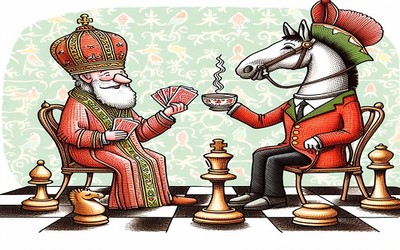
We've all experienced this. I understand you
As your chess stagnates, others reach new levels. Time to react
The article will discuss the reasons why you're not making progress and how to solve them based on my own experience.After reflecting on the topic of my second article, I've decided that the ideal approach is to address the question "why aren't you improving in chess?" candidly. Enclosed in quotation marks because it has its nuances, as we'll see.
Since visual analogies are helpful to me, I'll compare this situation with the types of people one encounters in the gym. It will be entertaining.
In the gym, we could distinguish 5 analogous profiles of chess players:
- Those who don't do exercises suitable for their current level.
- Those who practice incorrectly or without focus.
- The ones obsessed with instant results (constantly checking themselves in the mirror).
- Those with counterproductive habits.
- Congratulations to those who are improving!
1. Those who don't do exercises suitable for their current level
In the gym, we often see someone trying to lift much more weight than they can handle. Or there's also the opposite case: grabbing weights that are too light, believing that by doing endless repetitions, they'll achieve something.
Similar situations abound among ambitious chess players. Here are some typical cases:
- Endlessly doing Puzzle Storm or Puzzle Racer sessions just for fun. That doesn't lead to real improvement.
- Using endgame or middlegame books for +2200 Elo when you're at 1200 or 1400. Those texts are far from your zone of proximal development.
- Trying to master an opening repertoire at the level of a Top 10 world player.
So, how do you do exercises that are suitable for you?
Excellent question. You need to identify your specific errors to correct them efficiently. I'll elaborate more on this in upcoming articles.
For now, I hope the examples help illustrate the importance of pacing your training. Always aim for your next step, not the mountaintop.
2. Those who practice incorrectly or without focus
The most valuable thing is focus. Fully concentrating on the task at hand, without distractions. Rafa Nadal's uncle emphasized that a lot. Just like at the gym, many beginners don't execute exercises well due to lack of concentration or knowledge.
Example in chess: if you want to improve your board vision, do specific exercises for that. Don't mix it with other areas like calculation, endgames, or openings. Start with a simple endgame (King+Queen vs King) that doesn't require much mental effort. This way, you'll focus exclusively on visualizing the position in your mind, without the extra challenge of finding the winning plan.
That's what I mean: train on one front at a time. If you mix too many elements, you won't master any of them well, and it won't be a productive practice. Only through focused repetitions will you ingrain new skills.
3. The ones obsessed with instant results (constantly checking themselves in the mirror)
Surely you're familiar with the classic gym-goer who rushes to the mirror after each set to check if their muscles have swelled up. We all long to see rapid progress.
But beware, improvement takes time. Imagine an Olympic athlete: they train intensely for 4 years for a competition with no guarantees. Many give up when they don't see results in weeks or months. Big mistake.
The key is to focus on the process, not on short-term results. Train hard and smart, and then compare yourself to yourself in 3 years by asking these questions:
- Am I playing better than before?
- Am I achieving higher scores in tournaments now?
- Am I facing opponents of a higher level than years ago?
The point is to widen the time frame to evaluate your progress. In a few days, it's hard to notice significant improvements. But looking at months or years, the growth becomes evident.
I'll leave you with a video in Spanish with English subtitles that delves into this.
Saúl Craviotto Conference. Gold medalist in canoeing
4. Those with counterproductive habits
What's the use of an exhausting cardio session if you then indulge in a binge of 5 double cheeseburgers? I've witnessed that on more than one occasion at the gym.
For a chess player, bad habits are the recipe for stagnation. Some notorious examples:
- Blitz and bullet addictions: You internalize wrong moves as you can't review them calmly. The error becomes a habit that will sabotage you in standard-paced games.
- Irregular training: Consistency is indispensable.
- Entertainment content without substance: It distracts you from your growth plan.
- Not examining your mistakes: Impossible to improve if you don't detect flaws.
The list could go on. Remember, your habits define you. If you neglect that key area, your progress will come to a screeching halt. It's like contradicting physical effort by overeating after the gym. Your body won't change and might even regress. Analyze whether your current routines enhance or limit your growth.
5. Congratulations to those who are improving!
I want to dedicate this space to congratulate all the players who are overcoming obstacles and reaching new levels in their game. Seeing them improve consistently, with dedication and discipline, is a great inspiration. They demonstrate that sustained growth is possible in chess.
My sincere congratulations to these talents! They continue to raise the bar to motivate the rest of us.
6. Words of gratitude.
I hope you enjoyed this article and found the advice and analogies presented useful. Remember to put into practice the most relevant tips to your current situation to reinvigorate your progress on the chessboard.
If you enjoyed the reading, I would appreciate it if you could share the article to help me reach a wider audience. You can also give it a "Like" to contribute to my visibility on the platform. Simple actions like these motivate me to continue generating valuable content.
See you in the next article. Take care!
More blog posts by Ajedrezpreciso

Success Secrets: Unveiling the Chess Mastery Among Bishops and Knights
In this blog, you will explore how exchanging one minor piece (bishop or knight) for another (bishop…
